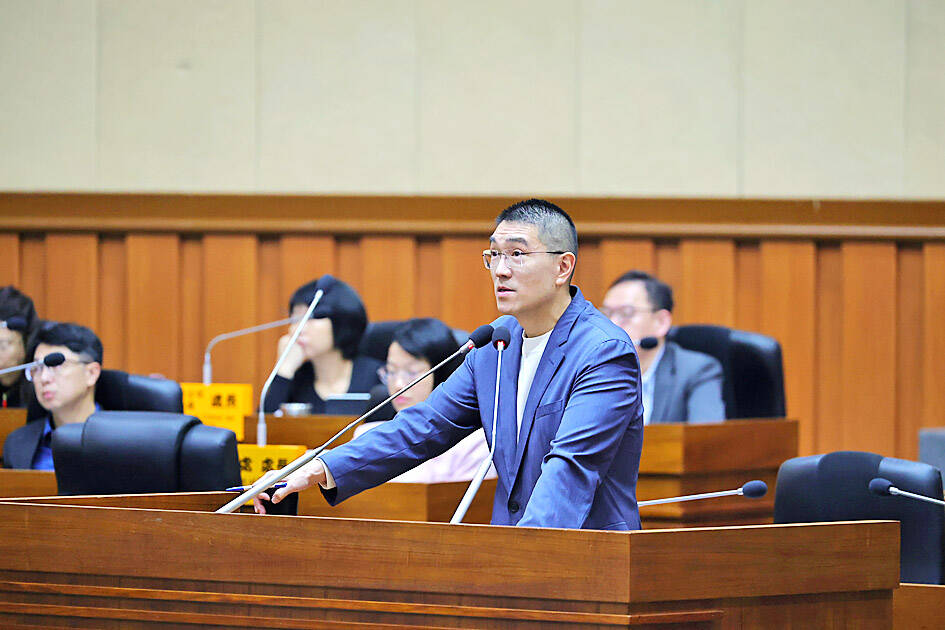Keelung Mayor George Hsieh (謝國樑) yesterday apologized over alleged illegal data access by a former Civil Affairs Department director amid recall campaigns targeting local councilors from the Democratic Progressive Party (DPP).
Hsieh, a member of the Chinese Nationalist Party (KMT), bowed deeply to DPP City Councilor Cheng Wen-ting (鄭文婷) during a city council meeting, and also apologized to the council and Keelung residents for the alleged abuse of power by Chang Yuan-hsiang (張淵翔) under his leadership.
The bow might seem belated, Hsieh said, adding that he had been “surprised and saddened” to learn of Chang’s alleged actions and was waiting for the results of an investigation to determine whether other officials were involved.

Photo: Yu Chao-fu, Taipei Times
Last month, prosecutors were investigating alleged forgery in recall campaigns across the country after the Central Election Commission found petitions bearing the names of deceased people.
The campaigns included petitions targeting DPP Keelung councilors Cheng and Jiho Tiun (張之豪).
Under recall law, campaigners must submit petitions signed by constituents of the target’s district to initiate a recall.
Following a review of material collected in raids and questioning, Keelung prosecutors said they suspected that Chang had illegally accessed household registration data to help revise and verify a KMT membership list in the city.
Prosecutors on April 29 sought approval to detain him incommunicado from the district court, which on May 6 approved the request.
Prosecutors said that Chang had told them he had accessed the system.
He has resigned from his post.
Meanwhile, two officials at Keelung’s Jhongjheng Household Registration Office were questioned and released on bail for allegedly contravening the Personal Data Protection Act (個人資料保護法).
Hsieh said that the two officials were also expected to resign.
Cheng accepted Hsieh’s apology, calling it “the foundation of a responsible government.”
Local citizens would be glad that Hsieh has finally apologized, she said.

The manufacture of the remaining 28 M1A2T Abrams tanks Taiwan purchased from the US has recently been completed, and they are expected to be delivered within the next one to two months, a source said yesterday. The Ministry of National Defense is arranging cargo ships to transport the tanks to Taiwan as soon as possible, said the source, who is familiar with the matter. The estimated arrival time ranges from late this month to early next month, the source said. The 28 Abrams tanks make up the third and final batch of a total of 108 tanks, valued at about NT$40.5 billion

Two Taiwanese prosecutors were questioned by Chinese security personnel at their hotel during a trip to China’s Henan Province this month, the Mainland Affairs Council (MAC) said yesterday. The officers had personal information on the prosecutors, including “when they were assigned to their posts, their work locations and job titles,” MAC Deputy Minister and spokesman Liang Wen-chieh (梁文傑) said. On top of asking about their agencies and positions, the officers also questioned the prosecutors about the Cross-Strait Joint Crime-Fighting and Judicial Mutual Assistance Agreement, a pact that serves as the framework for Taiwan-China cooperation on combating crime and providing judicial assistance, Liang

A group from the Taiwanese Designers in Australia association yesterday represented Taiwan at the Midsumma Pride March in Melbourne. The march, held in the St. Kilda suburb, is the city’s largest LGBTQIA+ parade and the flagship event of the annual Midsumma Festival. It attracted more than 45,000 spectators who supported the 400 groups and 10,000 marchers that participated this year, the association said. Taiwanese Designers said they organized a team to march for Taiwan this year, joining politicians, government agencies, professionals and community organizations in showing support for LGBTQIA+ people and diverse communities. As the first country in Asia to legalize same-sex

MOTIVES QUESTIONED The PLA considers Xi’s policies toward Taiwan to be driven by personal considerations rather than military assessment, the Epoch Times reports Chinese President Xi Jinping’s (習近平) latest purge of the Chinese People’s Liberation Army (PLA) leadership might have been prompted by the military’s opposition to plans of invading Taiwan, the Epoch Times said. The Chinese military opposes waging war against Taiwan by a large consensus, putting it at odds with Xi’s vision, the Falun Gong-affiliated daily said in a report on Thursday, citing anonymous sources with insight into the PLA’s inner workings. The opposition is not the opinion of a few generals, but a widely shared view among the PLA cadre, the Epoch Times cited them as saying. “Chinese forces know full well that